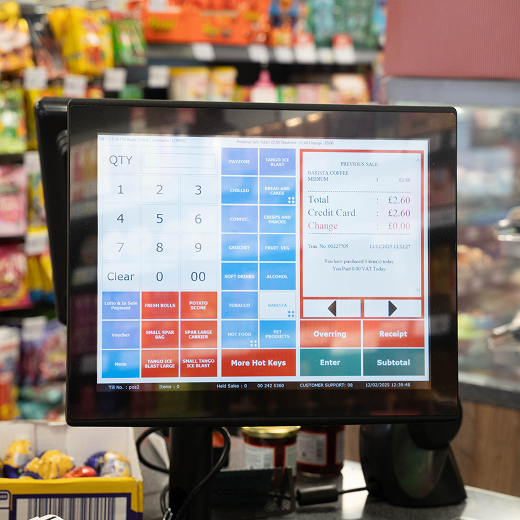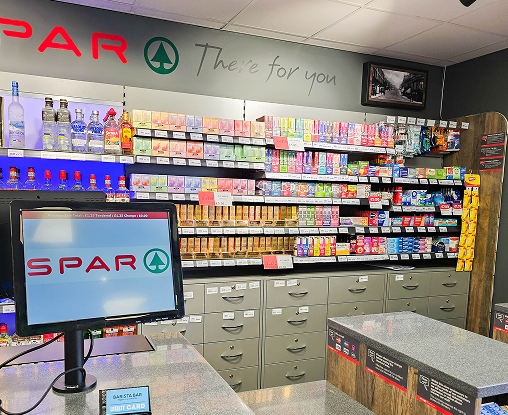Convenience stores are the lifeblood of local communities across the UK. They offer quick access to essential products, provide personalised service, and often act as social hubs within neighbourhoods. In recent years, the retail landscape has become increasingly competitive, with consumers expecting not only availability of products but also speed, efficiency, and a seamless shopping experience.
In this context, Point of Sale (POS) systems have emerged as a critical tool for store owners. Far beyond just a cash register, modern POS solutions integrate payment processing, inventory management, customer data analytics, and loyalty programmes. They empower retailers to streamline operations, reduce human errors, and deliver a personalised experience to every customer.
In this evolving landscape, MPOS, developed by MHouse Business Solutions Ltd in Motherwell, Scotland, is transforming the way convenience stores operate. Far beyond a traditional till, MPOS is a feature-rich Electronic Point of Sale (EPOS) system built by retailers for retailers, designed to streamline operations, elevate customer satisfaction, and increase profitability. With over 40 years of experience and more than 1,200 UK clients, MPOS has become a trusted partner for convenience retailers seeking growth through innovation.
The aim of this article is to explore how POS solutions directly contribute to enhancing customer satisfaction in UK convenience stores, analysing both the operational benefits and the impact on shopper experience.
1. Streamlining Transactions: Speed and Convenience
One of the most immediate benefits of modern POS systems is the acceleration of checkout processes. Long queues are a major source of frustration for customers, particularly during peak hours or busy weekends. Advanced POS solutions offer multiple payment options, including contactless cards, mobile wallets, and integrated card readers, that significantly reduce transaction times.
For example, with contactless payments accounting for nearly 40% of all card transactions in the UK, customers increasingly expect frictionless, speedy checkouts. Mobile wallet integrations allow shoppers to pay quickly using smartphones, which not only speeds up the process but also enhances the store’s modern and tech-savvy image.
MPOS directly addresses this challenge with a suite of solutions designed to accelerate every transaction. The MPOS Till integrates seamlessly with payment terminals and Viva.com, allowing stores to accept multiple payment methods, from contactless cards and mobile wallets to chip-and-pin transactions. This flexibility reduces queue times, enhances security, and ensures every customer can pay in their preferred way. Additionally, MPOS Self-Service Kiosks empower customers to scan and pay independently, reducing staff dependency during peak hours.These kiosks not only speed up service but also improve accuracy, minimise cash handling, and support loyalty integrations for a more personalised experience.
2. Inventory Management: Always Stocked, Always Ready

A major factor in customer satisfaction is product availability. Running out of stock can lead to lost sales and disappointed shoppers. Modern POS systems provide real-time inventory tracking, alerting store owners when items are low and automatically suggesting reorder quantities.
MPOS eliminates this frustration through advanced inventory control. The MPOS Handheld Terminal (HHT) enables real-time stock tracking and instant updates from anywhere in the store. Staff can upload invoices, manage promotions, or create purchase orders directly from the shop floor, ensuring shelves stay stocked and popular products remain available.
Complementing this, MPOS Electronic Shelf Edge Labels (ESELs) update product prices and promotions in real time, guaranteeing price consistency between shelf and till. These digital labels not only improve accuracy but also enhance store appearance and reduce manual workload, helping retailers save time while maintaining a professional, tech-forward image.
Stores using automated inventory management have reported significant reductions in stockouts, ensuring that popular products are consistently available. This reliability builds customer trust and loyalty, as shoppers know they can depend on their local store for everyday essentials.
3. Personalising the Customer Experience
POS systems collect data on customer purchases and behaviour, enabling store owners to tailor offerings and promotions. Personalisation can take many forms:
- Targeted discounts or offers based on past purchases.
- Customised loyalty rewards that reflect customer preferences.
- Recommendations for products commonly purchased together.
The MPOS Backoffice software collects and stores all customer and sales data securely, enabling retailers to analyse patterns and refine their engagement strategies.
By using these insights, convenience stores can make customers feel recognised and valued, creating a more engaging shopping experience.
4. Loyalty Programmes: Encouraging Repeat Business
Integrating loyalty programmes with POS systems allows stores to reward frequent customers efficiently. Points, discounts, and exclusive offers incentivise shoppers to return regularly. Data shows that businesses with structured loyalty systems experience measurable improvements in retention, which directly correlates with higher customer satisfaction.
MPOS helps convenience store owners turn data into loyalty through its MyDD Points integration, a built-in loyalty system that rewards customers for every purchase. Using purchase history and customer preferences, retailers can offer tailored promotions, exclusive deals, and rewards that truly resonate. Whether it’s targeted discounts or customised reward points, this approach builds emotional connection and encourages repeat visits.
5. Data-Driven Insights: Understanding Customers
Beyond transactions, POS systems generate valuable analytics about purchasing trends, peak hours, and popular products. Store owners can leverage this information to make strategic decisions, such as:
- Adjusting staff schedules to minimise queues.
- Planning promotions around high-demand items.
- Offering products that meet emerging customer preferences.
This analytical approach ensures that stores not only respond to customer needs but anticipate them, enhancing overall satisfaction.
From detailed sales reports to performance analytics, MPOS helps identify best-selling products, peak hours, and purchasing trends. The Sales Checker app, accessible on both Android and iPhone, gives store owners real-time visibility into store performance anytime, anywhere.
These data insights enable informed decisions: adjusting staffing levels during busy periods, optimising product placement, and running promotions when they’ll have the biggest impact. With MPOS AI, powered by Visu AI, the system goes a step further, using artificial intelligence to track inventory movement, prevent losses, and provide predictive insights that anticipate customer needs before they arise.
6. Security and Trust
Security is a crucial aspect of customer satisfaction. Modern POS systems use advanced encryption to protect payment information and ensure compliance with data protection regulations such as GDPR. Secure systems reduce the risk of fraud, giving customers confidence that their personal and financial information is safe when shopping.
MPOS prioritises security and compliance, integrating advanced encryption and GDPR-aligned safeguards to protect both customer and store data. The platform’s integration with Viva.com ensures all transactions are secure and compliant, offering real-time settlement and offline payment options to maintain business continuity even during network interruptions.
Furthermore, MPOS AI strengthens in-store security with intelligent video analytics that detect unauthorised movements, identify potential risks, and alert staff instantly. This proactive approach builds trust and confidence among customers who know their information, and their safety, is protected at every level.
7. Operational Efficiency: Behind-the-Scenes Benefits
POS systems improve operational efficiency, which indirectly benefits customers. Features such as simplified staff training, multitasking capabilities, and seamless integration with online orders allow employees to focus more on customer service rather than administrative tasks. During peak hours, these efficiencies translate into smoother operations and a better overall experience for shoppers.
While customer satisfaction sits at the forefront, MPOS enhances operations behind the scenes too.
From its Backoffice system that simplifies bookkeeping and purchase ordering, to integration with upcoming tools like Xero for automated accounting, MPOS streamlines daily management tasks so store teams can focus on what truly matters, the customer.
The system’s intuitive interface reduces training time, while its UK-based technical support team provides reliable assistance, ensuring smooth operation 24/7. Combined with tools like wastage labels, which help manage near-expiry products, MPOS empowers staff to work smarter, not harder, improving morale and efficiency throughout the store.
8. Emerging Trends in UK POS Solutions
Several trends are shaping POS adoption in UK convenience stores:
- Cloud-Based POS Systems: These provide scalability and remote management, allowing store owners to monitor multiple locations from a single interface.
- AI and Predictive Analytics: Artificial intelligence helps forecast demand, optimise inventory, and provide personalised marketing.
- Self-Service Kiosks: Increasingly popular in urban convenience stores, these reduce queues and empower customers to complete transactions independently.
The future of retail belongs to stores that embrace technology, and MPOS is at the forefront of this shift.
Cloud-based management allows owners to monitor multiple sites remotely, while integrations with Snappy Shopper and Foodel (coming soon) expand sales channels by connecting physical stores with online customers.
The rise of AI-driven analytics, self-service kiosks, and digital shelf labels signals a move toward intelligent retailing, where data, automation, and customer convenience converge. MPOS ensures that convenience stores not only keep up with these changes but lead them, setting new standards for the UK retail landscape.
Case Study: Londis N16 – From Corner Shop to Community Hub
Londis N16, located in Stoke Newington, North London, has been a family-run establishment since 1979. Under the stewardship of Priyesh and Alpesh Patel, the store has evolved from a traditional convenience shop into a vibrant community hotspot. This transformation was driven by a combination of embracing modern POS technology and a deep commitment to community engagement.
The Transformation Journey
1. Embracing Modern POS Solutions
Recognising the need to modernise operations, Londis N16 integrated a state-of-the-art POS system that streamlined transactions, improved inventory management, and provided valuable customer insights. This technological upgrade enabled the store to:
- Enhance Transaction Efficiency: The new POS system reduced checkout times, allowing for quicker service during peak hours.
- Optimise Inventory Management: Real-time tracking of stock levels ensured popular items were always available, reducing stockouts and customer dissatisfaction.
- Gather Customer Data: The system collected purchasing patterns, enabling personalised promotions and loyalty programmes.
2. Introducing Community-Centric Initiatives
Beyond technological upgrades, the Patel family introduced several initiatives that resonated with the local community:
- Supper Clubs: The store began hosting community supper clubs, offering homemade Gujarati meals. These events not only provided a unique dining experience but also fostered a sense of belonging among residents.
- Social Media Engagement: Leveraging platforms like Instagram, Londis N16 showcased their events and products, building a loyal online following and attracting new customers.
- Local Collaborations: The store partnered with local producers and artists, supporting the local economy and strengthening community ties.
Outcomes
The integration of modern POS solutions and community-focused initiatives led to several positive outcomes:
- Increased Footfall: The store saw a significant rise in daily visitors, with many coming specifically for the supper clubs and special events.
- Enhanced Customer Loyalty: Personalised promotions and a strong community presence cultivated a loyal customer base.
- Recognition and Awards: Londis N16’s efforts were recognised in the retail industry, earning accolades such as the ‘Food to Go Retailer of the Year’ at the 2024 Asian Trader Awards.
Londis N16’s journey underscores the importance of integrating modern POS technology with a customer-centric approach. By embracing innovation and staying attuned to community needs, convenience stores can transform into vital community hubs, ensuring long-term success and customer satisfaction.
Conclusion and Key Takeaways
Modern POS solutions are far more than transactional tools, they are essential for driving customer satisfaction in UK convenience stores. By streamlining transactions, ensuring product availability, enabling personalisation, supporting loyalty programmes, and providing actionable data insights, these systems allow store owners to meet and exceed customer expectations.
Key Takeaways:
- Speed and convenience at checkout are critical to positive customer experiences.
- Accurate inventory management prevents stockouts and builds trust.
- Personalised services and loyalty programmes encourage repeat visits.
- Data-driven insights enable proactive decision-making.
- Security measures enhance customer confidence and protect sensitive data.
Suggestions for Retailers:
- Invest in a POS system that integrates payment processing, inventory, and loyalty management.
- Use analytics from the POS system to identify trends and optimise store operations.
- Offer multiple payment methods, including contactless and mobile wallets, to meet modern shopper expectations.
- Train staff thoroughly on the POS system to ensure smooth, error-free transactions.
- Explore AI-driven solutions and self-service kiosks to enhance customer experience and operational efficiency.
Modern POS systems are no longer just about processing sales, they are the backbone of retail success. With MPOS, UK convenience stores can deliver faster service, maintain perfect stock levels, offer personalised rewards, and gain deep operational insights, all through one unified platform.
By integrating advanced technologies like AI, ESELs, and cloud-based management, MPOS empowers retailers to anticipate customer needs, improve efficiency, and create the frictionless, satisfying experiences today’s shoppers expect.
Ultimately, MPOS isn’t just a system, it’s a partner in progress. It helps local stores thrive, build loyalty, and deliver the kind of seamless, customer-focused service that keeps communities connected. Ultimately, embracing modern POS solutions is not just about technology, it’s about creating a seamless, personalised, and secure shopping experience that keeps customers coming back.















